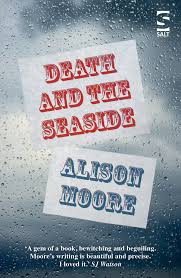 I didn’t plan it that way, but Alison Moore’s new novel seemed like an excellent choice of reading matter for my own trip to the seaside – visiting my mother down in Cornwall last week – and so it proved. Sarah Crown has written an insightful review for The Guardian in which she examines the significance of the novel’s title and its relationship to Schubert’s ‘Death and the Maiden’ quartet, so I don’t need to repeat that parallel here. What I most definitely do want to repeat though is my previously expressed conviction that Alison Moore is one of the most gifted and interesting writers of weird fiction in Britain today.
I didn’t plan it that way, but Alison Moore’s new novel seemed like an excellent choice of reading matter for my own trip to the seaside – visiting my mother down in Cornwall last week – and so it proved. Sarah Crown has written an insightful review for The Guardian in which she examines the significance of the novel’s title and its relationship to Schubert’s ‘Death and the Maiden’ quartet, so I don’t need to repeat that parallel here. What I most definitely do want to repeat though is my previously expressed conviction that Alison Moore is one of the most gifted and interesting writers of weird fiction in Britain today.
Bonnie Falls has just turned thirty. After having abandoned her university degree, her life seems to have stumbled into something of a dead end. Until recently she has been living with her parents, but after they insist on her leaving home she finds herself working two cleaning jobs to pay the rent on a dingy ground floor flat that still seems locked inside the lives of its previous occupants. Into this stasis walks Sylvia Slythe, who owns the building Bonnie lives in and who seems uncommonly determined to take an interest in the wellbeing of her new tenant. When Sylvia learns that Bonnie once entertained ambitions of being a writer, she demands to see Bonnie’s manuscripts. When Bonnie proves reluctant to share them she steals them instead. What exactly is going on here? How does Sylvia happen to know Bonnie’s mother? The answers to these questions – like the set-up itself – are weird. There is an atmosphere of threat around Bonnie that is made all the more discomfiting by the fact that Bonnie herself seems utterly impervious to it.
What I noticed immediately about Death and the Seaside is its clear and direct relationship to Moore’s 2015 work ‘The Harvestman’, a short story published as a standalone chapbook by Nightjar Press. It is not that Death and the Seaside is an expanded version of ‘The Harvestman’, exactly – more that it spins off from it at a tangent, a happenstance I can understand perfectly as so many of my own works have bought their freedom in this self same manner. I enjoy both ‘The Harvestman’ and Death and the Seaside all the more because of it, this interlinking, this cousinage, which makes their universe feel bigger and deeper and more alive.
Like Anita Brookner’s heroines, you might assume that Bonnie would come across as pathetic. She does not. There truly is something heroic about her, something tenacious and completely grounded in the way she refuses to be defined by others’ assumptions. She’s living her life, puzzling things out – why the hell should she be the character that others imagine she is? There were passages in this book where Bonnie’s situation became so uncomfortable to read about that I found myself hurriedly flipping pages, just to make sure that – but no, that would be too spoilery. Let’s just say that even when she seems most in peril, Bonnie’s doggedness, her pragmatism in the face of danger seems to get her out of trouble every time. I really liked her, which is perhaps why for me at least the pay-off of Death and the Seaside was one of the most satisfying of the year so far.
And it is this Bonnie-like pragmatism that best characterises Alison Moore’s fiction as a whole. I’ve read all three of Moore’s novels to date, plus a good number of her short stories, and in all of them I find this unifying feeling of unspecified threat. Not ghosts exactly, nothing so concrete, so predictable – yet ghosts nonetheless, the ghosts we create ourselves, simply by living our lives, by having pasts and making mistakes and feeling regret.
Moore’s landscapes – her insistence on lived, inhabited reality – are achingly familiar: seventies housing estates, seaside promenades, motorway service stations, bits of waste ground in permanent danger of being tarmacked over. They are made strange by the heightened perceptions of her protagonists, and by the intimate personal knowledge of these same landscapes, these situations that we ourselves bring into the narrative by the act of reading it.
I’ve been thinking of Anita Brookner a lot recently – about how important her novels were to me when I first encountered them in my twenties, about how timeless they are, how defiant the vision, how exquisite the writing. Much of the modern fiction that seeks to inhabit a similar milieu seems clumsy and obvious and disingenuous by comparison. Less honest, more apologetic. Not so Moore’s. In many ways, Alison Moore might be counted as Anita Brookner’s natural heir, exploring many of the same concerns – Prufrockism, unfulfilled ambition, the conundrum of living alone – but with an extra edge of darkness, of horror that makes her fiction entirely of today, and of the weird.